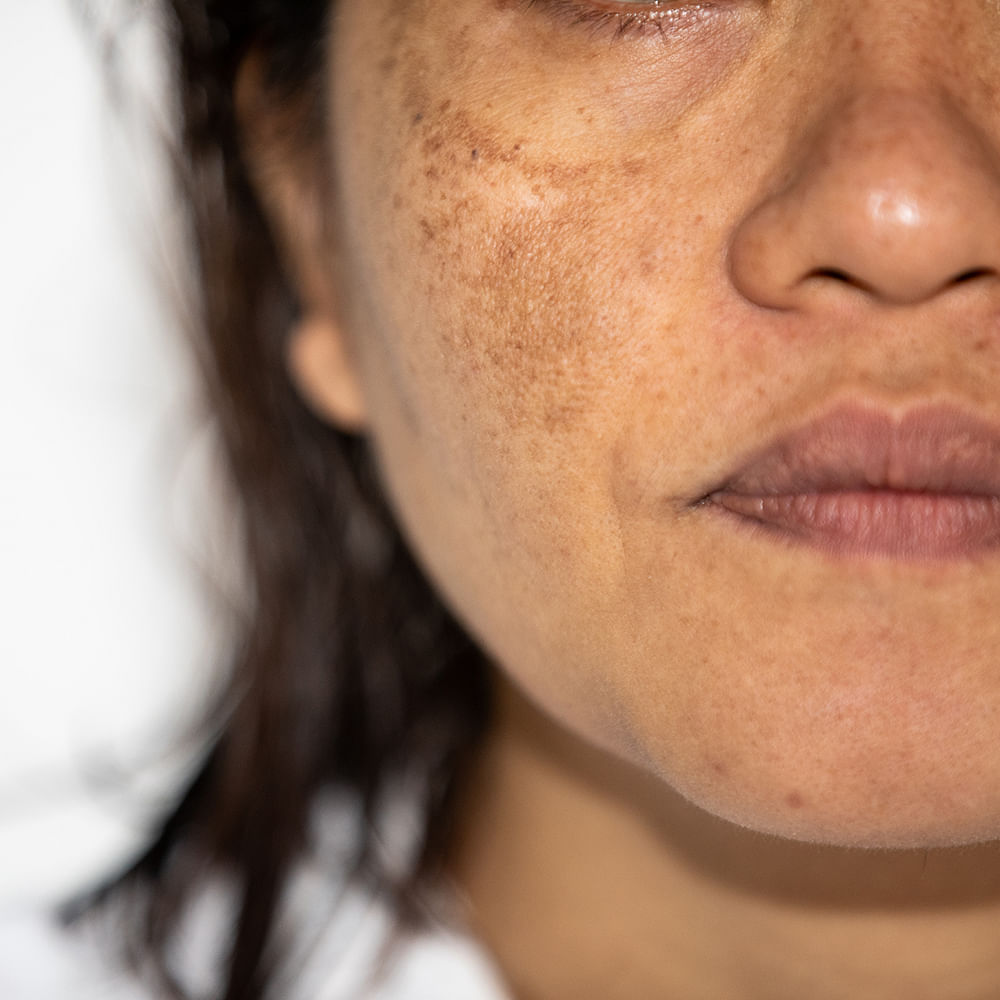Hyperpigmentation is a common skin concern in India since our skin's blessed with more melanin production. Melanin is the pigment that lends colour to our skin and when this pigment produces in overdrive, patches of skin turn darker than its actual colour (usually around the mouth, temples and sideburns especially where Indian skin is concerned). At times, it occurs in the form of age spots, melasma or post-inflammatory hyperpigmentation in the case of acne or other skin conditions, causing dark spots. When does melanin produce in excess you ask? A number of factors but sun exposure, hormonal influences, age and skin injuries or inflammation being the common ones. While it doesn't physically pain in any way, it's a personal choice to want to work on your skin to prevent it from getting extreme hyperpigmentation. And to guide with that, we roped in an expert, Dr. Geetika Srivastava, dermatologist, and founder of Influennz Skin and Hair Clinic, Delhi. As our expert, here's all we learnt about hyperpigmentation from her:
Hyperpigmentation: Dermatologist Shares All There's To Know About & Prevention
What is Hyperpigmentation?
Dr. Geetika says, 'Hyperpigmentation, a common skin condition, that is characterised by an excess production of melanin, the pigment responsible for skin tone. This surplus melanin can lead to localised or generalised darkening of the skin.'
'Pigmentation' encompasses both hyperpigmentation (increased melanin) and hypopigmentation (decreased melanin), both of which can lead to discolouration in the skin but here, we are focusing on the former.
Apparently, there are different types of hyperpigmentation and Dr. Geetika explains them as;
Superficial or Epidermal Hyperpigmentation: Melanin accumulates in the superficial layers of the skin, such as the stratum corneum, resulting in brown discolouration. This type is typically easier to treat.
Deep or Dermal Hyperpigmentation: Melanin, or melanophages, gather in the deeper dermal layers, lending the skin a subtle blue or grey hue. Examples of dermal pigmentation disorders include Nevus of Ota, lichen planus pigmentosus, and ashy dermatoses.
Causes of Hyperpigmentation
Dr. Geetika shares that hyperpigmentation can stem because of various factors like-
Sun Exposure: UVB rays can induce tanning, while blue light exposure can contribute to pigmentation issues in Indian skin.
Inflammation: Skin conditions like acne and other inflammatory disorders can trigger hyperpigmentation.
Hormonal Influences: Fluctuations in sex hormones can lead to pigmentation changes, particularly around the areola and genital areas. Interestingly, melatonin, the sleep hormone, aids in lightening skin pigmentation.
Drug Reactions: Certain medications, such as Hydroquinone and minocycline, may provoke hyperpigmentation.
Nutritional Deficiencies: Insufficient levels of Vitamin B12 can cause pigmentation around the mouth.
Cosmetic Irritants: Contact dermatitis from cosmetics can induce hyperpigmentation, known as reihls melanosis.
Determining Treatment For Hyperpigmentation
According to Dr. Geetika, factors that play a key role in determining the course of action for treating one's face or hyperpigmentation are;
Extent of Involvement: Assess whether the pigmentation affects the face, body, or both.
Colour and Pattern: Different pigmentation colours and patterns may suggest specific conditions, such as the butterfly pattern associated with melasma.
Now, let's move to the different treatment options one can consider to help with hyperpigmentation.
Hyperpigmentation Treatments
Hyperpigmentation is often harmless, but people may choose to remove or reduce it depending on personal preference. So, while you cannot 'cure' or stop your skin from getting pigmented, you can take steps to prevent it from getting extreme or reducing its effect. Here's how;
For Facial Hyperpigmentation
Dr. Geetika suggests going for topical treatment like microdermabrasion, chemical peels, and lasers like Pico and Q-switch along with skin-lightening creams. She also says 'While many desire fairer skin, it's essential to understand that skin tone can only be lightened to a certain extent. Achieving a drastically lighter tone, as often depicted in advertisements, is unrealistic.' So, as they say, 'anything in excess is harmful' does apply to this area as well.
Secondly, doctor Geetika recommends to take sun protection seriously. She says, 'Avoiding sun exposure is crucial'. Or, double down on your efforts with reapplying sunscreen to keep your skin protected from the sun whenever you step out.
Body Hyperpigmentation
Dr. Geetika says, 'Similar treatments as for the face, but with adjustments for the thicker skin of the body. This may include stronger concentrations of lightening agents and more aggressive chemical peels or laser treatments.'
Skincare For Hyperpigmented Skin
Apart from getting medicated skin treatments, it's absolutely essential that you consult your dermatologist for a skincare routine that helps with reducing hyperpigmentation. Dr. Geetika suggests using SPF and incorporating ingredients like vitamin C, kojic acid, licorice, and arbutin in your daytime routine while employing exfoliating agents such as retinol, AHA, and azelaic acid for nighttime.
Pro-tip: Check out our recommendations for the best serums for treating hyperpigmentation here.
Conclusion
Hyperpigmentation is a multifaceted condition influenced by numerous factors. Understanding its causes and treatment options is essential for effectively managing and addressing pigmentation concerns. By incorporating appropriate skincare practices and treatments, individuals can work towards achieving a more balanced and radiant complexion.

